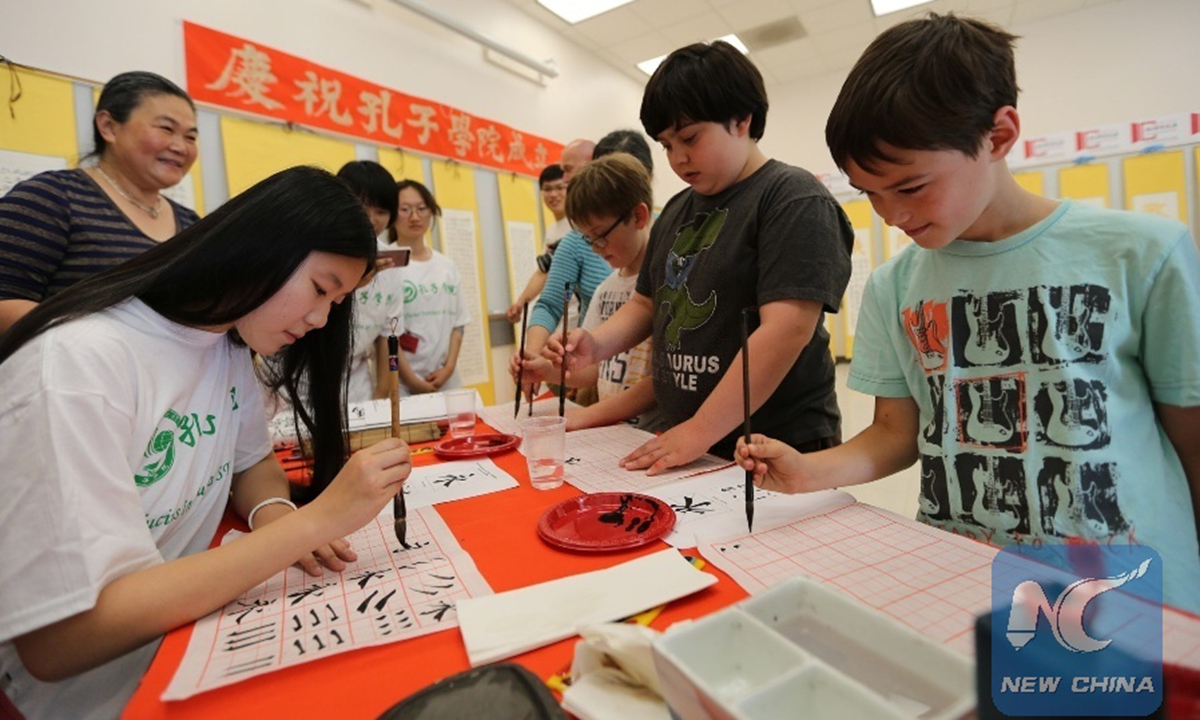Confucius Institute label shows US a petty superpower: Global Times editorial
Source: Global Times Published: 2020/8/14 17:03:40

American students practising Chinese calligraphy at the Confucius Institute in San Francisco, US, September 27, 2014. Photo: Xinhua
The US Department of State on Thursday decided to designate the Confucius Institutes US Center as a foreign mission. David Stilwell, a top US diplomat in East Asia, said the US is not looking to close the country's Confucius Institutes, but "would ask that universities, again, take a hard look at what those institutes are doing on their campuses." However, putting the "foreign mission" label on Confucius Institutes will surely lead to the institutes facing more controversy in the US, and undermine the enthusiasm of universities in the US to cooperate with them.
The US has found faults with Confucius Institutes for quite a long time. Some US senators have promoted suppression and crackdowns on certain institutes in their respective constituencies. However, demanding that Confucius Institutes must register as foreign missions is likely to have an extensive and long-term impact.
The move follows the US' recent crackdown on Chinese media outlets in the country and the enforced shutdown of the Chinese Consulate General in Houston. It is another step taken by the US to "decouple" from China in the field of people-to-people exchanges and it has an opportunistic motive - that is, it aims to maintain China-US tension by creating new disputes between the two countries for the sake of this year's presidential election. It's foreseeable that the US government will provoke more China-US disputes that will be the equivalent of election campaign propaganda, creating an atmosphere that the US can easily place the blame on China for everything.
The attack on Confucius Institutes is a typical example of how the US is oversensitive to politicize everything. Confucius Institutes saw their best development overseas in the US, as its society has a demand for such people-to-people exchanges. The learning centers help Americans learn Putonghua as well as basic Chinese culture, satisfying the demands of a growing number of people in the US. The Chinese side sends teachers and volunteers, and offers teaching materials, while the US side provides the necessary classrooms and offices. This working model is also applied to other institutes in universities around the world.
Some US political elites have created all the noise by accusing Confucius Institutes of penetrating US universities and sabotaging freedom of speech. This claim has astonished the Chinese people. How can the institutes penetrate the US by teaching Americans to speak Putonghua, sing Chinese songs, make dumplings and learn Tai Chi? Is it because American students don't scold China at classes partly funded by the Chinese side? Does this undermine freedom of speech?
Almost all of the Confucius Institutes in the US were set up at the request of US schools. The rapid development of the institutes in the US reflects the explosive growth of trade and people-to-people exchanges between the two countries in recent years. If China really had any consideration other than teaching about increasing the number of institutes in the US, its simple wish is to cultivate the goodwill of US society in relation to China so it could create a favorable atmosphere for the healthy development of bilateral relations.
This is not something that needs to be hidden. Is it not right that China shows goodwill to improve China-US relations? Most governments around the world do not oppose institutions set up by other countries to spread friendship in their own. Even if countries have ideological concerns or differences, they will coordinate with the relevant institutions to achieve the balance they desire.
The US is the most petty-minded of all big powers. Many Western countries have Confucius Institutes, but only the US, the world's sole superpower, feels threatened. Where is the US' confidence? Where is its cultural tolerance?
Chinese people used to believe the US, as a superpower, had a special level of openness and inclusiveness. Now our impressions are being constantly subverted. The US is more vigilant than China in many aspects. Take the field of telecommunications: If China were as vigilant as the US, China wouldn't have developed the way it has and would be too scared to sleep. American culture has reached into China so deeply, how can China survive?
China has introduced countless US elements through reform and opening-up. Now Washington wants to talk about cultural "reciprocity" with China. It should wait until Americans burn paper offerings on China's Tomb-Sweeping Day, young Americans celebrate Chinese Valentine's Day and are obsessed with drinking douzhir (or fermented bean drink).
When US Secretary of State Mike Pompeo visited Central and Eastern Europe promoting an anti-China alliance, the Department of State he leads put a new label on Confucius Institutes. It seems Pompeo is taking the promotion of a new cold war as his personal career goal. He may be hoping that "Pompeo's Cold War" be written in future history textbooks. But what he is doing is against the development of the world. His actions will only leave a stain on history.
Posted in: EDITORIAL